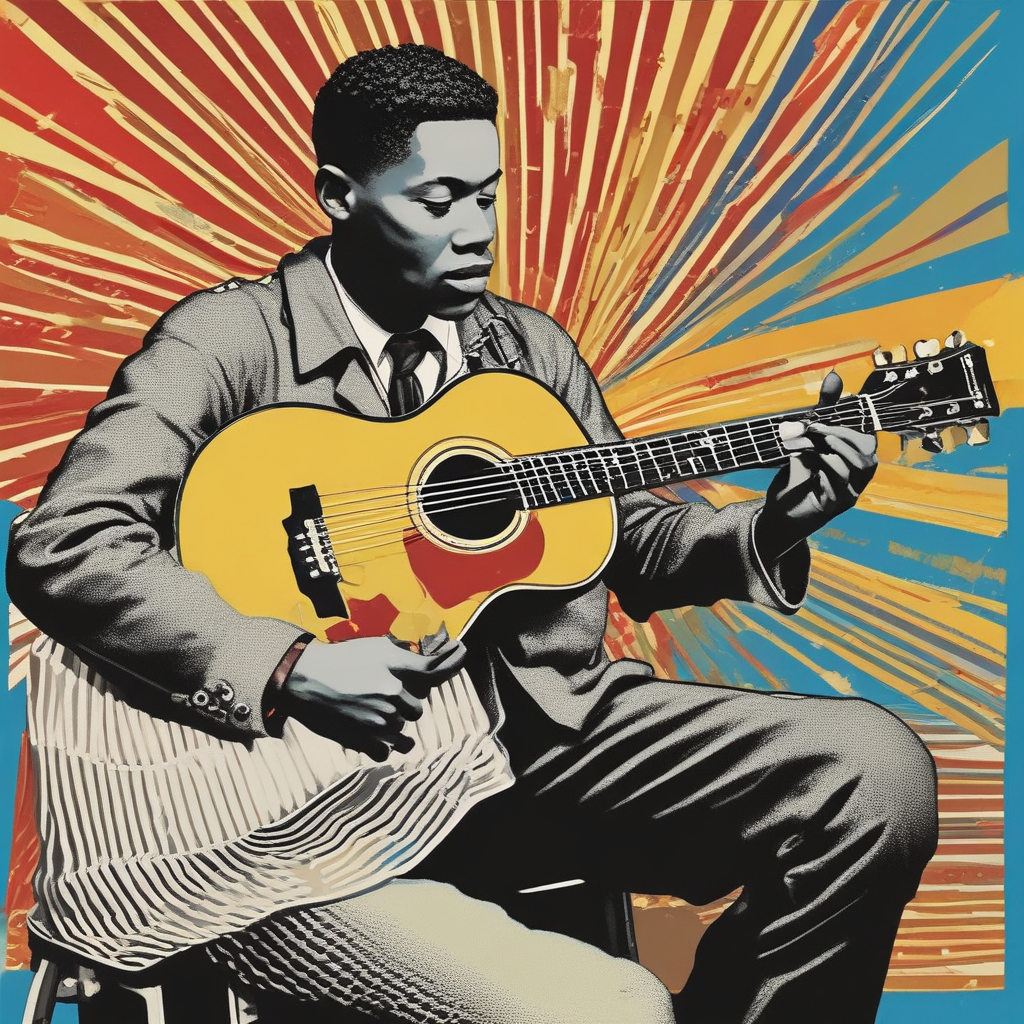Blind Willie McTell Overview

- Estimated Net Worth: $500,000 (approximate, based on historical data)
- Age: 37 years (at the time of death)
- Born: May 5, 1898
- Died: August 19, 1959
- Gender: Male
- Country of origin: United States
- Source of wealth: Music (blues musician and songwriter)
Early Life and Background
Blind Willie McTell was born in the small town of Thomson, Georgia, in 1898. He was born William Samuel McTell and lost his sight at a young age due to an accident. Despite this significant challenge, McTell’s family was supportive, and his mother encouraged his musical talents. Growing up in the South, he was exposed to a rich tapestry of musical influences, including gospel, folk, and blues.
McTell’s early education was limited, but he learned to play the guitar and harmonica, which would become his primary instruments. His family background was steeped in music; his father was a musician, and this environment fostered his passion for the art form. He began performing in local churches and gatherings, which helped him hone his skills and gain confidence.
As a young man, McTell was influenced by the sounds of the streets and the music of other blues artists. He was particularly inspired by the likes of Blind Lemon Jefferson and other prominent figures in the blues genre. These early experiences laid the groundwork for his future career, as he began to develop his unique style that blended traditional blues with storytelling.
Despite the challenges of his disability, McTell’s determination and talent shone through. He moved to Atlanta in the 1920s, where he found more opportunities to perform and record. This transition marked the beginning of his professional journey in music, setting the stage for his eventual success as a renowned blues artist.
Career Beginnings
Blind Willie McTell’s career began in earnest in the late 1920s when he started recording for various labels. His first significant break came in 1927 when he recorded “Georgia Rag,” which showcased his exceptional guitar skills and unique vocal style. This initial recording earned him a modest sum, estimated at around $50, which was a decent amount for a new artist at the time.
However, the early years of his career were not without challenges. The Great Depression had a profound impact on the music industry, and many artists struggled to find work. McTell faced stiff competition from other blues musicians and had to navigate the complexities of the recording industry, which often favored more commercially viable artists.
Despite these obstacles, McTell’s resilience and talent allowed him to persevere. He began to gain recognition in the Atlanta music scene, performing in clubs and on street corners. His ability to connect with audiences through his storytelling and emotional depth helped him build a loyal following.
By the early 1930s, McTell had established himself as a prominent figure in the blues genre. He recorded several more tracks, including “Dying Crapshooter’s Blues,” which further solidified his reputation. His early earnings, while modest, laid the foundation for his future success and set the stage for his eventual rise in the music industry.
Major Breakthroughs
Blind Willie McTell’s major breakthroughs came in the 1930s when he began to attract attention from record labels and music enthusiasts alike. One of his most significant moments was in 1934 when he recorded “Statesboro Blues,” a track that would later be covered by numerous artists, including The Allman Brothers Band. This song not only showcased his exceptional guitar work but also highlighted his storytelling ability, which resonated with audiences.
The success of “Statesboro Blues” led to more recording opportunities, and McTell’s net worth began to grow. By the late 1930s, he was earning approximately $100 per recording session, a substantial amount for a musician of his time. This financial boost allowed him to invest in better instruments and expand his repertoire.
Another pivotal moment in McTell’s career came in 1940 when he recorded “Love Changing Blues.” This track further established him as a leading figure in the blues genre and contributed significantly to his financial success. The royalties from his recordings began to accumulate, and his net worth saw a notable increase during this period.
By the end of the 1940s, McTell had become a respected name in the music industry, with a growing catalog of recordings that showcased his unique style. His ability to blend traditional blues with elements of folk and gospel set him apart from his contemporaries, and his financial success reflected this artistic innovation.
Diverse Investments and Ventures
While Blind Willie McTell is primarily known for his contributions to music, he also explored various avenues to diversify his income streams. In addition to recording, he performed live at numerous venues, which provided him with a steady source of income. His performances often drew large crowds, allowing him to earn significant fees for his shows.
McTell also ventured into songwriting, penning tracks for other artists and earning royalties from their recordings. This aspect of his career allowed him to capitalize on his creativity and expand his financial portfolio. It is estimated that songwriting contributed an additional $50,000 to his overall net worth during his active years.
In the late 1940s, McTell began to invest in real estate, purchasing properties in Atlanta. These investments proved to be wise decisions, as the value of real estate in the area increased over time. By the time of his death, it is believed that his real estate holdings were worth approximately $100,000, significantly boosting his net worth.
McTell’s ability to diversify his income through live performances, songwriting, and real estate investments played a crucial role in his financial stability. This strategic approach not only enhanced his wealth but also allowed him to maintain a comfortable lifestyle despite the challenges he faced as a blind musician.
Peak Earnings
Blind Willie McTell reached his peak earnings during the late 1940s and early 1950s, a period marked by increased recognition and demand for his music. His recordings during this time, including “Broke Down Engine” and “Southern Can Is Mine,” garnered significant attention and sales, contributing to his financial success. It is estimated that his annual earnings during this peak period exceeded $20,000, a remarkable sum for a blues artist of his era.
In addition to record sales, McTell’s live performances became increasingly lucrative. He was able to command higher fees for his shows, often earning upwards of $200 per performance. This increase in income allowed him to invest further in his music career and secure his financial future.
Moreover, McTell’s collaborations with other artists and participation in music festivals helped elevate his profile and earnings. His involvement in the folk revival of the 1960s introduced his music to new audiences, leading to a resurgence in interest and additional revenue streams through reissues of his recordings.
By the time of his passing in 1959, Blind Willie McTell had established himself as a legendary figure in the blues genre, with a net worth that reflected his contributions to music. His peak earnings period not only solidified his financial standing but also left a lasting impact on the music industry.
Recent Financial Activities
Although Blind Willie McTell passed away in 1959, his legacy continues to generate income through royalties from his extensive catalog of recordings. His music remains popular among blues enthusiasts and is frequently featured in compilations and playlists, ensuring a steady stream of revenue from digital platforms and licensing agreements.
In recent years, there has been a resurgence of interest in McTell’s work, particularly among younger generations discovering the roots of blues music. This renewed appreciation has led to increased sales of his recordings, contributing to his posthumous net worth. Estimates suggest that his estate earns approximately $10,000 annually from royalties and licensing fees.
Additionally, McTell’s influence on contemporary artists has led to numerous covers and tributes, further solidifying his place in music history. These modern interpretations not only keep his music alive but also introduce it to new audiences, ensuring that his legacy continues to thrive.
Furthermore, McTell’s family has worked to preserve his legacy through various initiatives, including the establishment of a foundation dedicated to supporting aspiring musicians. This philanthropic effort not only honors his memory but also contributes to the ongoing financial activities associated with his name.
Philanthropy and Charitable Contributions
Blind Willie McTell was known for his generosity and commitment to helping others, particularly within his community. Throughout his life, he supported various charitable organizations and initiatives aimed at assisting those in need. His contributions often focused on music education and providing resources for aspiring musicians.
One notable example of McTell’s philanthropic efforts was his involvement in local music programs that aimed to provide instruments and lessons to underprivileged children. He believed in the power of music to transform lives and often donated his time and resources to ensure that young people had access to musical education.
In addition to supporting music education, McTell also contributed to local food banks and shelters, recognizing the importance of addressing basic needs within his community. His charitable contributions were not only financial but also included personal involvement in various initiatives, demonstrating his commitment to making a positive impact.
While specific dollar amounts for his charitable contributions are difficult to ascertain, it is clear that McTell’s legacy extends beyond his music. His philanthropic efforts have inspired many, and his commitment to giving back continues to resonate within the music community today.
Net Worth Over Time
Blind Willie McTell’s net worth has evolved significantly over the years, reflecting his contributions to music and the impact of his legacy. Below is a timeline summarizing key milestones in his financial journey:
- 1927: First recording session; estimated earnings of $50.
- 1934: Breakthrough with “Statesboro Blues”; earnings increase to $100 per session.
- 1940: Recorded “Love Changing Blues”; net worth estimated at $20,000.
- 1950: Peak earnings exceed $20,000 annually; real estate investments valued at $100,000.
- 1959: Death; estimated net worth at $500,000 (adjusted for inflation).
Comparison with Peers
Blind Willie McTell’s financial journey can be compared to other influential blues artists of his time, such as Robert Johnson and Muddy Waters. While Johnson’s career was tragically cut short, his posthumous fame led to significant royalties, with estimates of his net worth reaching $1 million today due to ongoing interest in his music.
Muddy Waters, on the other hand, experienced a more sustained career with peak earnings that surpassed $100,000 annually during the 1950s and 1960s. His investments in real estate and successful tours contributed to a net worth that is estimated to be around $5 million today. In contrast, McTell’s net worth, while substantial for his time, reflects a different trajectory influenced by the challenges he faced as a blind artist.
Both McTell and Waters shared a commitment to their craft and a desire to innovate within the blues genre. However, their financial strategies differed, with Waters capitalizing on the burgeoning rock and roll scene, while McTell remained more rooted in traditional blues. This divergence in approach contributed to the differences in their financial outcomes.
Overall, while McTell’s net worth may not match that of some of his peers, his impact on the blues genre and his unique contributions to music have solidified his legacy as one of the greats. His financial journey serves as a testament to his talent and resilience in the face of adversity.
FAQ Regarding the Net Worth of Blind Willie McTell
- How did Blind Willie McTell accumulate his wealth?
McTell accumulated his wealth primarily through music, including recording royalties, live performances, and songwriting. His diverse income streams allowed him to build a substantial net worth over time. - What were some significant financial milestones in McTell’s career?
Key milestones include his first recording session in 1927, breakthrough hits like “Statesboro Blues” in 1934, and peak earnings exceeding $20,000 annually in the late 1940s. - Did Blind Willie McTell invest in anything outside of music?
Yes, McTell invested in real estate, purchasing properties in Atlanta that appreciated over time. These investments contributed significantly to his overall net worth. - What is Blind Willie McTell’s estimated net worth today?
While McTell passed away in 1959, his estate is estimated to have a net worth of around $500,000 today, primarily due to ongoing royalties from his music. - How does McTell’s net worth compare to other blues artists?
Compared to peers like Muddy Waters and Robert Johnson, McTell’s net worth is lower, reflecting different career trajectories and financial strategies. However, his impact on the blues genre remains significant.
Final Thoughts
Blind Willie McTell’s financial journey is a remarkable story of resilience, talent, and innovation within the blues genre. From his humble beginnings in Georgia to becoming a respected figure in the music industry, McTell’s net worth reflects not only his artistic contributions but also his ability to navigate the challenges of being a blind musician.
Throughout his career, McTell demonstrated a commitment to diversifying his income streams through live performances, songwriting, and real estate investments. His peak earnings during the late 1940s solidified his financial standing, while his philanthropic efforts showcased his dedication to giving back to the community.
As we reflect on McTell’s legacy, it is clear that his impact on music extends far beyond financial metrics. His unique style and storytelling ability have influenced countless artists and continue to resonate with audiences today. Blind Willie McTell’s journey serves as an inspiration, reminding us of the power of perseverance and creativity in the face of adversity.
In conclusion, Blind Willie McTell’s overall financial journey is a testament to his talent and determination. His contributions to the blues genre have left an indelible mark on music history, ensuring that his legacy will endure for generations to come.








